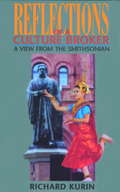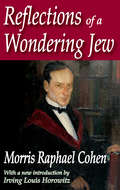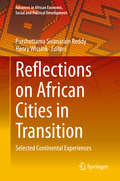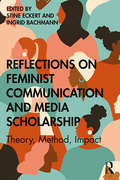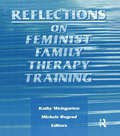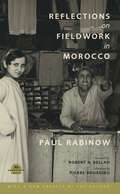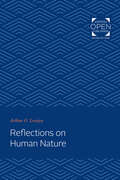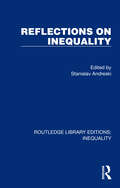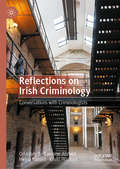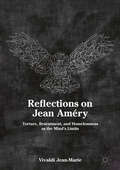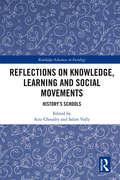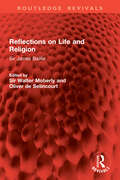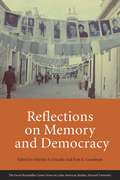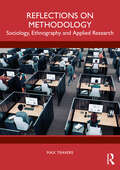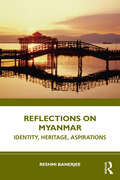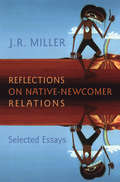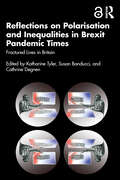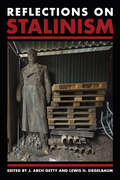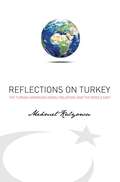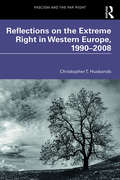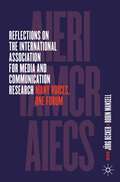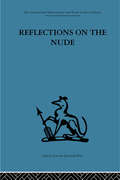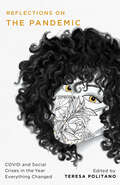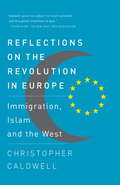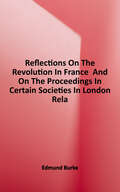- Table View
- List View
Reflections of a Culture Broker
by Richard KurinIs culture brokered like stocks, real estate, or marriage? In this engaging book, Richard Kurin shows that cultures are also mediated and indeed brokered by countries, organizations, communities, and individuals -- all with their own vision of the truth and varying abilities to impose it on others. Drawing on his diverse experiences in producing exhibitions and public programs, Kurin challenges culture brokers -- defined broadly to include museum professionals, film-makers, journalists, festival producers, and scholars of many disciplines -- to reveal more clearly the nature of their interpretations, to envision the ways in which their messages can "play" to different audiences, and to better understand the relationship between knowledge, art, politics, and entertainment. The book documents a variety of cases in which the Smithsonian has brokered culture for the American public: a planned exhibit on Jerusalem had to balance both Israeli and Palestinian agendas; debates over the 1996 Olympic Arts Festival presented differing visions of the American South; and the National Air and Space Museum's controversial display of the Enola Gay prompted the Smithsonian to re-examine the role of national museums. Arguing that cultural exhibits reflect a series of decisions about representing someone, someplace, and something, Reflections of a Culture Broker discusses the ethical and technical problems faced by not only those who practice in a museum setting but also anyone charged with representing culture in a public forum.
Reflections of a Wondering Jew
by Morris CohenMuch as he considered himself a philosopher, Morris Raphael Cohen was also immersed in the machinery of social life. From his first years of "engagement" as a volunteer teacher in Thomas Davidson's school for working-class people, to his last as professor of philosophy at New York's City College and at the University of Chicago, he constantly sought to understand the underlying assumptions of human behavior.The studies Cohen gathered together for Reflections of a Wondering Jew are an indication of representative achievements of his life. He was deeply involved in the experience of the American Jewish community, and much of his work here consists of an inquiry into and analysis of specifically Jewish affairs. Some of his most valuable contributions to American thought and maturity are those that were never included in standard philosophical efforts. His work and scholarship provide foundations for the field of human problems and the history of ideas. These lectures illuminated the way forward in so many of our crisis years.There is a certain tragedy to the fact that for many decades Morris Raphael Cohen had hoped to organize and put into systematic form his literary reflections on Jewish problems and American liberalism. Towards the end of his life, he faced the realization that many of his intended writings would never reach fruition. Though this volume may not be quite what Cohen intended, it is a product of a mature giant in American intellectual history.
Reflections on African Cities in Transition: Selected Continental Experiences (Advances in African Economic, Social and Political Development)
by Henry Wissink Purshottama Sivanarain ReddyThis volume describes African cities in transition, and the economic, socio-political, and environmental challenges resulting from rapid post-colonial urbanization. As the African continent continues to transition from urban configurations inherited from colonial influences and history, it faces issues such as urban slum expansion, increased demands for energy and clean water, lack of adequate public transportation, high levels of inequality among different socio-economic population strata, and inadequate urban governance, planning, and policies. African cities in transition need to reconsider current policies and developmental trajectories to facilitate and sustain economic growth and Africa’s strategic repositioning in the world.Written by an international team of scholars and practitioners, this volume uses case studies to focus on key issues and developmental challenges in selected African cities. Topics include but are not limited to, smart cities, changing notions of democracy, the city’s role in attaining the SDGs, local governance, alternative models for governance and management, corruption, urbanisation and future cities.
Reflections on Feminist Communication and Media Scholarship: Theory, Method, Impact
by Stine EckertThis collection brings together ten of the most distinguished feminist scholars whose work has been celebrated for its excellence in helping to lay the foundation of feminist communication and media research. This edited volume features contributions by the first ten renowned communication and media scholars that have received the Teresa Award for the Advancement of Feminist Scholarship from the Feminist Scholarship Division (FSD) of the International Communication Association (ICA): Patrice M. Buzzanell, Meenakshi Gigi Durham, Radha Sarma Hegde, Dafna Lemish, Radhika Parameswaran, Lana F. Rakow, Karen Ross, H. Leslie Steeves, Linda Steiner, and Angharad N. Valdivia. These distinguished scholars reflect on the contributions they have made to different subfields of media and communication scholarship, and offer invaluable insight into their own paths as feminist scholars. They each reflect on matters of power, agency, privilege, ethics, intersectionality, resilience, and positionality, address their own shortcomings and struggles, and look ahead to potential future directions in the field. Last but not least, they come together to discuss the impact of the COVID-19 pandemic on women, marginalized people, and vulnerable populations, and to underline the crucial need for feminist communication and media scholarship to move beyond Eurocentrism toward an ethics of care and global feminist positionality. A comprehensive and inspiring resource for students and scholars of feminist media and communication studies.
Reflections on Feminist Family Therapy Training (Journal Of Feminist Family Therapy Ser.)
by Michele Bograd Kaethe WeingartenAlthough feminist family therapy has been gaining recognition and followers in recent years, little is known about the variety of experiences, philosophies, and private learnings of feminist practitioners. Reflections on Feminist Family Therapy Training utilizes first-person accounts, theory, and commentary to explore the challenges feminist teachers and practitioners face and the aspects of their practice that are seldom considered.Readers of Reflections on Feminist Family Therapy Training acquire effective teaching strategies and a sensitivity to the intersection of cultural diversity and feminism. Students are introduced to several contextual factors that shape personal and professional experiences, as well as techniques that address predictable patterns of behavior and attitudes toward feminist family therapy in a variety of settings. The book presents innovative ideas and strategies from experienced trainers for tolerating, working with, and resolving gaps between theory and practice and for confronting hostility or tension within specific institutional contexts.Aimed at building bridges between teachers and practitioners of family therapy from a feminist perspective, Reflections on Feminist Family Therapy Training explores and helps you answer the following questions: What similarities and differences exist between American and European feminist family therapists? What special challenges does the feminist therapist face in a conventional training institute? Does a feminist or liberal context attend adequately to the needs of the multicultural student body? How does a trainer&’s national standing or tenure status promote or harm her freedom to practice openly in a specifically feminist way? What new directions and opportunities exist for feminist family therapists?Reflections on Feminist Family Therapy Training looks at the difficulties women practitioners face in convincing family therapy to recognize the significance of gender as a variable factor. In doing so, it offers specific classroom applications and general approaches to the feminist task of getting unheard and repressed voices acknowledged. Finally, the book outlines future directions for expanding and improving feminist-informed training and for giving it a more central and integrated position in the curricula.
Reflections on Fieldwork in Morocco: Thirtieth Anniversary Edition, with a New Preface by the Author
by Robert N. Bellah Paul Rabinow Pierre BourdieuIn this landmark study, now celebrating thirty years in print, Paul Rabinow takes as his focus the fieldwork that anthropologists do. How valid is the process? To what extent do the cultural data become artifacts of the interaction between anthropologist and informants? Having first published a more standard ethnographic study about Morocco, Rabinow here describes a series of encounters with his informants in that study, from a French innkeeper clinging to the vestiges of a colonial past, to the rural descendants of a seventeenth-century saint. In a new preface Rabinow considers the thirty-year life of this remarkable book and his own distinguished career.
Reflections on Human Nature
by Arthur O. LovejoyOriginally published in 1961. Arthur O. Lovejoy, beginning with his book The Great Chain of Being, helped usher in the discipline of the History of Ideas in America. In Reflections on Human Nature, Lovejoy devotes particular attention to influential figures such as Hobbes, Locke, Bishop Butler, and Mandeville, tracing developments and changes in the concept of human nature through the seventeenth and eighteenth centuries. He also discusses the theory of human nature held by the founders of the American Constitution, giving special attention to James Madison and the "Federalist Papers."
Reflections on Inequality (Routledge Library Editions: Inequality #1)
by Stanislav AndreskiOriginally published in 1975, this anthology of essays focusses on the historical dimension of class inequality which has long concerned both sociologists and social philosophers but has often been neglected in literature. Although Marx is the first name to come to mind when social inequality and class struggles are mentioned, most of the authors included here precede him. Each analyses and discusses the problems of class conflict as they understood them in the light of their own times. Taken together these writers treat stratification as essentially a pecking order where position is determined by relative power – a notion which subsumes rather than contradicts the economic interpretation of social inequality because wealth is a form of power. The relation between the views of these authors and the well-known theory of Marx is discussed in the Introduction.
Reflections on Irish Criminology: Conversations with Criminologists
by Orla Lynch Helen Russell Yasmine Ahmed Kevin HosfordThis book explores the development of the discipline of Criminology on the island of Ireland, through conversations with leading criminologists. Adding depth and breadth to the understandings of this growing discipline, leading scholars discuss their personal journey to Criminology, their research areas, their theoretical influences and the impact of the discipline of Criminology on how we think about criminal justice in Ireland and beyond. Research topics include desistence, victims’ rights, parole, policing and research methods. The book explores what influences framed the work of key thinkers in the area and how Criminology intersects with policy and practice within and beyond the criminological and criminal justice fields. It provides an insight into how the discipline has emerged as a discrete subject through a discussion of Ireland's key historical moments. It argues that Ireland's unique historical, cultural, political, social and economic arrangements and research about Ireland have much to offer the international field of Criminology. This volume also reflects on future directions for Irish Criminology, as well as sounding warnings to ensure the healthy development of the field as a discipline in its own right and as an interdisciplinary undertaking.
Reflections on Jean Améry: Torture, Resentment, and Homelessness as the Mind’s Limits
by Vivaldi Jean-MarieThis book elaborates Jean Améry’s critique of philosophy and his discussion of some central philosophical themes in At the Mind’s Limits and his other writings. It shows how Améry elaborates the shortcomings and unfitness of philosophical theories to account for torture, the experience of homelessness, and other indignities, and their inability to assist with overcoming resentment. It thus teases out the philosophical import of Jean Améry's critique of philosophy, which constitutes his own philosophical testament of being an inmate at Auschwitz. This book situates At the Mind’s Limits in the context of twentieth-century Continental philosophy. On the one hand, it elaborates Améry’s engagement with key philosophical figures. On the other hand, it shows how thoroughly Améry denounces the limits of the philosophical enterprise, and its impotence in capturing and accounting for the crimes of the Third Reich.
Reflections on Knowledge, Learning and Social Movements: History's Schools (Routledge Advances in Sociology)
by Aziz Choudry Salim VallyHow do educators and activists in today’s struggles for change use historical materials from earlier periods of organizing for political education? How do they create and engage with independent and often informal archives and debates? How do they ultimately connect this historical knowledge with contemporary struggles? Reflections on Knowledge, Learning and Social Movements aims to advance the understanding of relationships between learning, knowledge production, history and social change. In four sections, this unique collection explores: • Engagement with activist/movement archives • Learning and teaching militant histories • Lessons from liberatory and anti-imperialist struggles • Learning from student, youth and education struggles Six chapters foreground insights from the breadth and diversity of South Africa’s rich progressive social movements; while others explore connections between ideas and practices of historical and contemporary struggles in other parts of the world including Argentina, Iran, Britain, Palestine, and the US. Besides its great relevance to scholars and students of Education, Sociology, and History, this innovative title will be of particular interest to adult educators, labour educators, archivists, community workers and others concerned with education for social change.
Reflections on Life and Religion: Sir James Baillie (Routledge Revivals)
by Sir Walter Moberly Oliver De SelincourtFirst published in 1952, Reflections on Life and Religion is a collection of selected entries made by Sir James Baillie from 1893 to his death. These entries, preserved as MS. Volumes labeled “Privatissima”, are a record of the inner mind of a thinker of wide culture who enjoyed extensive contacts with public affairs as well as with worlds of philosophy and education.The book is divided into three main sections dealing with religion; ethical and social philosophy; and metaphysics and theory of knowledge. Each of these sections is further divided into several shorter subsections, in accordance with the requirements of the subject area. The appendix contains a number of short entries which could not find a suitable place in the main body of the text.This volume will be a fascinating read for anyone interested in religion, philosophy, and particularly metaphysics.
Reflections on Memory and Democracy
by Merilee S. Grindle Erin E. GoodmanWhat is the role of history in the life of new democracies? In this volume, twelve reflections-the work of journalists, writers and poets, literary critics, political scientists, historians, philosophers, economists, and linguists-explore legacies of authoritarian political regimes noted for repression and injustice, questioning how collective experiences of violence shape memory and its relevance for contemporary social and political life in Latin America. The past matters deeply, the essayists agree, but the past itself is debatable and ambiguous. Avoiding its repetition introduces elusive and contested terrain; there are, indeed, many histories, many memories, and many ways they can be reflected in democratic contexts. In much of contemporary Latin America, this difficult past has not yet been fully confronted, and much remains to be done in reconciling memory and democracy throughout the region. As this is done, the lessons of the past must contribute not only to the construction of democratic institutions, but also to the engagement of democratic citizens in the collective work of governance and participation.
Reflections on Methodology: Sociology, Ethnography and Applied Research
by Max TraversReflections on Methodology offers a new and engaging means of teaching Honours students or those starting a PhD in Sociology about methodological issues. Instead of the usual survey approach, it shows the importance of debates about methodology, the value of an ethnographic approach and the challenges of applied research through a series of case studies.The text offers insightful short essays on methodological issues such as critical theory, interpretivism, and mixed methods, alongside Travers' reflections on significant ethnographic projects in areas like court reform, comparative criminology, and immigration control. The book combines methodological discussions with autobiographical elements, making complex research topics accessible and grounded in real-world applications. The central theme and argument are that the thoughtful sociologist should seek to move from the outside to the inside of institutions and social groups and the transformative effect on understanding is illustrated through a number of ethnographic projects. This is also an "end-of-career" book: it employs an autobiographical, narrative approach in describing how Max Travers’ intellectual interests developed, the importance of methodological debate, and the challenges of doing applied research. There are also chapters that review developments in teaching and research in universities over the last thirty years.This book offers resources that give variety and encourage Honours students to think critically about research. Each 5,000 words chapter is self-contained with an abstract, provocative guide to further reading, exercise and questions.
Reflections on Myanmar: Identity, Heritage, Aspirations
by Reshmi BanerjeeMyanmar is known for its engaging history, rich cultural heritage, and diverse ethnic communities. Its tumultuous political past has been discussed by academics and policy makers for decades; however, the land of the Shwedagon cannot only be defined by conflict and contestation. Myanmar is complex and multi-layered with innumerable issues shaping its identity and manifold interpretations creating its distinctiveness. A deeper comprehension of its past glory with thoughtful deliberation on its socio-economic challenges helps to understand the country better. This book fills this gap by focusing on four broad themes––reminiscence, restoration, re-evaluation, and resurrection. It studies interconnected issues ranging from nostalgia and belonging to Myanmar’s contribution to art and heritage (through its museums, cinema, folk traditions); from the problems of landlessness, resource dispossession, and climate change to the experience of marginalized groups. The author weaves these themes into a common narrative of discovering Myanmar through a holistic lens. The book aims to explore the country through its history, culture, communities, and challenges. A unique contribution, the book highlights the myriad facets of Myanmar by contemplating on its inherent strengths and visible weaknesses. It would be indispensable for scholars and researchers of Southeast Asian studies, Asian studies, area studies, Myanmar studies, political studies, cultural studies, and sociology.
Reflections on Native-Newcomer Relations
by J. R. MillerThe twelve essays that make up Reflections on Native-Newcomer Relations illustrate the development in thought by one of Canada's leading scholars in the field of Native history - J.R. Miller. The collection, comprising pieces that were written over a period spanning nearly two decades, deals with the evolution of historical writing on First Nations and Métis, methodological issues in the writing of Native-newcomer history, policy matters including residential schools, and linkages between the study of Native-newcomer relations and academic governance and curricular matters. Half of the essays appear here in print for the first time, and all use archival, published, and oral history evidence to throw light on Native-Newcomer relations.Miller argues that the nature of the relationship between Native peoples and newcomers in Canada has varied over time, based on the reasons the two parties have had for interacting. The relationship deteriorates into attempts to control and coerce Natives during periods in which newcomers do not perceive them as directly useful, and it improves when the two parties have positive reasons for cooperation. Reflections on Native-Newcomer Relations opens up for discussion a series of issues in Native-newcomer history. It addresses all the trends in the discipline of the past two decades and never shies from showing their contradictions, as well as those in the author's own thinking as he matured as a scholar.
Reflections on Polarisation and Inequalities in Brexit Pandemic Times: Fractured Lives in Britain
by Katharine Tyler Cathrine Degnen Susan BanducciThis is the first interdisciplinary edited collection that examines the manifestation of social inequalities and polarisations in Britain throughout the dual crises of the Brexit vote and the Covid-19 pandemic. The volume demonstrates that Brexit and the pandemic are not self-contained events but rather are major ongoing processes that have impacted all aspects of British social and political life. Drawing on an array of empirical case studies conducted in the wake of the Brexit vote and during pandemic lockdowns, chapters trace how these processes illuminate, consolidate, and amplify existing and entrenched social inequalities and polarisations that shape the fabric of British society, including racial, ethnic, class, migrant, national, and gendered inequalities.The volume is divided into three parts centred on (a) the nation; (b) the community; and (c) the media. Each section draws on diverse analytical frameworks and methodological approaches from across the social sciences, arts, and humanities to provide empirically grounded critiques of reductive media-led narratives with the goal of accounting for and explaining the reproduction of social inequalities and emergence of polarisations in these Brexit pandemic times. In so doing, the case studies include critical analysis of lockdown novels; the speeches of political elites from across the political spectrum; ‘ordinary’ people’s everyday traditional and social media practices; as well as their opinions based on the findings of large-scale surveys and in-depth place-based ethnographic fieldwork conducted across rural, urban, and suburban areas of England. Each chapter also includes artwork by contemporary artist Helen Snell that complements, develops, and extends the book’s core themes and arguments.This collection will be insightful reading for students and academics across the social sciences, arts, and humanities (especially from the disciplines of sociology, politics, social anthropology, human geography, sociolinguistics, contemporary art, and literature) concerned with questions of social inequality and polarisation.Chapters 1, 2, 7 and 11 of this book is freely available as a downloadable Open Access PDF at http://www.taylorfrancis.com under a Creative Commons [Attribution-Non Commercial-No Derivatives (CC BY-NC-ND)] 4.0 license.
Reflections on Stalinism (NIU Series in Slavic, East European, and Eurasian Studies)
by J. Arch Getty and Lewis H. SiegelbaumReflections on Stalinism distills decades of historical thought and research, bringing together twelve senior scholars of Soviet history who began their careers during the Cold War to examine their views of Stalinism. They present insights into the role of personality in statecraft, the social underpinnings of dictatorship and state terrorism, historians' attachments to their subjects, historical causality, the applicability of Marxist categories to Soviet history, the relationship of Soviet history to post-Soviet Russia, and more. Essays address the transformation of a peasant country into a superpower and the causes and scale of domestic bloodshed. Reflections on Stalinism ultimately tackles an age-old question: Do powerful people make history or are they the product of it?
Reflections on Turkey: Turkish-American-Israeli Relations and the Middle East
by Mehmet KalyoncuThis book is a collection of the essays on Turkey that analyze the international, regional and national political developments in the last several years covering a wide variety of issues from the transformation of Turkish politics to the changing role of Turkey in its region, and from the ups and downs in the Turkish-Israeli relations to the looming threat posed by Iran&’s nuclear program to the issue of Islamophobia and the rise of xenophobic political ideologies in Europe and the US. The book in general takes a critical look at the evolving Turkish foreign policy towards its immediate neighbors and the international system. Kalyoncu does intend to take stock of the past five years (2007-2012) in terms of the political and social developments that has made Turkey, Turkish-American-Israeli relations and the Middle East, what they are today.
Reflections on the Extreme Right in Western Europe, 1990–2008 (Routledge Studies in Fascism and the Far Right)
by Christopher T. HusbandsDuring the last three decades or so there has been a significant growth of extreme right voter support, in Europe and elsewhere in the world. The chapters in this book look at an earlier period before most of this increase. Comprising eight previously published articles or book chapters and two hitherto unpublished studies, this book gives extended accounts of the major extreme-right political parties or movements in a number of west European countries, looking both at their antecedents and also at their their support and significance in the 1980s and early 1990s. The countries covered in detail are France, the Federal Republic of Germany (old and new regions), the Netherlands, Belgium, Switzerland, and Austria. During the last three decades some earlier parties of the extreme right in these west European countries have disappeared into oblivion, to be superseded by replacements; others have survived and flourished. Given the date when most of these chapters were written, they are now to be regarded as contributions to a modern history about the status and relevance of the respective parties or movements. The book also includes an introductory essay that discusses issues arising from the disputed labelling terminology used to describe such parties and identifies themes that feature in the more recent literature about the subsequent and current state of the extreme right in Europe. The book will be of particular interest to researchers on the contemporary politics of the extreme-right in Europe, as well as being a valuable resource for those teaching courses on this topic or on general political sociology.
Reflections on the International Association for Media and Communication Research: Many Voices, One Forum
by Robin Mansell Jörg BeckerThroughout its 65-year history, the International Association for Media and Communication Research (IAMCR) has sought to facilitate international exchanges and research collaborations among academics and journalists in the field of media and communication. Created during a time of strong ideological tension following World War II in 1957 and with the support of UNESCO, the contributors to this edited collection highlight how the IAMCR and its members shaped the field of media and communications research. From its beginnings focusing on the mass media, including the press and journalism education, today the Association attracts researchers and practitioners who undertake critical analysis of contemporary media and communications, including online platforms and their governance. Consistent themes throughout the Association’s history have been its concern with human rights, law, culture and the political economy of the media and communication industries. Not content simply to understand developments in the media and communications field around the world, the Association’s membership has sought to ‘change the world’ through its published research and its participation in global, regional, national and local policy debate and practice.This volume is organised in four parts following an introduction authored by editors who are active members of IAMCR. Part I highlights eight prominent scholarly traditions of research which have attracted the interest of scholars from around the world as well as the way the Association has sought to be inclusive of early career scholars. Part II offers seven chapters which bring to light the political struggles of a membership seeking to engage in scholarship across the East – West divide and to contribute to global debates aimed at fostering an inclusive, fair and equitable international information and communication order through engagement with United Nations sponsored initiatives. Part III turns to accounts of the way members from selected countries and regions have contributed to the Association’s scholarly work. The last part highlights the significant scholarly and institution-building contributions of James Halloran, IAMCR’s President from 1972 to 1988 and other prominent contributors to the study of culture and the political economy of media and communications
Reflections on the Nude (International Behavioural And Social Sciences Ser. #Vol. 100)
by Adrian StokesTavistock Press was established as a co-operative venture between the Tavistock Institute and Routledge & Kegan Paul (RKP) in the 1950s to produce a series of major contributions across the social sciences. This volume is part of a 2001 reissue of a selection of those important works which have since gone out of print, or are difficult to locate. Published by Routledge, 112 volumes in total are being brought together under the name The International Behavioural and Social Sciences Library: Classics from the Tavistock Press. Reproduced here in facsimile, this volume was originally published in 1967 and is available individually. The collection is also available in a number of themed mini-sets of between 5 and 13 volumes, or as a complete collection.
Reflections on the Pandemic: COVID and Social Crises in the Year Everything Changed
by Joyce Carol Oates Marc Aronson James Goodman Mark Doty Susan Miller David Orr David Greenberg Rigoberto González Angelique Haugerud Jonathan Scott Holloway Naomi Jackson Gregory Pardlo Caridad Svich Ulla D. Berg Vikki S. Katz Patricia Akhimie Belinda McKeon Louis Masur Amy Jordan Stephanie Bonne Paul Falkowski Mary E. O'Dowd James W. Hughes Yalidy Matos Kimberly Camp Kelly-Jane Cotter David Dreyfus Adrienne Eaton Katherine Epstein Mackenzie Kean Amir Lighty Revathi Machan Stephen Masaryk Yehoshua November Katherine Ognyanova Steve Pikiell Benjamin Pukert Leslieann Hobayan Leah Falk Teresa PolitanoReflections on the Pandemic: COVID and Social Crises in the Year Everything Changed is a collection of essays, poems, and artwork that captures the raw energy and emotion of 2020 from the perspective of the Rutgers University community. The project features work from a diverse group of Rutgers scholars, students, staff, and alumni. Reflecting on 2020 from a number of perspectives – mortality, justice, freedom, equality, democracy, family, health, love, hate, economics, history, medicine, science, social justice, the environment, art, food, sanity – the book features contributions by Evie Shockley, Joyce Carol Oates, Naomi Jackson, Ulla Berg, Grace Lynne Haynes, Jordan Casteel, and President Jonathan Holloway, among others. This book, through its rich and imaginative storytelling at the intersection of scholarly expertise and personal narrative, brings readers into the hearts and minds of not just the Rutgers community but the world. Contributors include: Patricia Akhimie, Marc Aronson, Ulla D. Berg, Stephanie Bonne, Stephanie Boyer, Kimberly Camp, Jordan Casteel, Kelly-Jane Cotter, Mark Doty, David Dreyfus, Adrienne E. Eaton, Katherine C. Epstein, Leah Falk, Paul G. Falkowski, Rigoberto González, James Goodman, David Greenberg, Angelique Haugerud, Grace Lynne Haynes, Leslieann Hobayan, Jonathan Holloway, James W. Hughes, Naomi Jackson, Amy Jordan, Vikki Katz, Mackenzie Kean, Robert E. Kopp, Christian Lighty, Stephen Masaryk, Louis P. Masur, Revathi V. Machan, Yalidy Matos, Belinda McKeon, Susan L. Miller, Yehoshua November, Joyce Carol Oates, Mary E. O’Dowd, Katherine Ognyanova, David Orr, Gregory Pardlo, Steve Pikiell, Teresa Politano, en Purkert, Nick Romanenko, Evie Shockley, Caridad Svich, and Didier William.
Reflections on the Revolution In Europe
by Christopher CaldwellIn light of cultural crises such as the Danish cartoon controversy and the terrorist attack on the Charlie Hebdo newspaper in Paris, Christopher Caldwell's incisive perspective has never been more timely or indispensible. Reflections on the Revolution in Europe is destined to become the classic work on how Muslim immigration permanently reshaped the West. This provocative and unflinching analysis of Europe's unexpected influx of immigrants investigates the increasingly prominent Muslim populations actively shaping the future of the continent. Muslims dominate or nearly dominate many important European cities, including Amsterdam and Rotterdam, Strasbourg and Marseille, the Paris suburbs and East London, and in those cities Islam has challenged the European way of life at every turn, becoming, in effect, an "adversary culture." In Reflections on the Revolution in Europe, Caldwell examines the anger of natives and newcomers alike. He exposes the strange ways in which welfare states interact with Third World customs, the anti-Americanism that brings European natives and Muslim newcomers together, and the arguments over women and sex that drive them apart. He considers the appeal of sharia, "resistance," and jihad to a second generation that is more alienated from Europe than the first, and addresses a crisis of faith among native Europeans that leaves them with a weak hand as they confront the claims of newcomers.From the Trade Paperback edition.ion.
Reflections on the Revolution in France: And On The Proceedings In Certain Societies In London Relative To That Event
by Edmund BurkeBurke's seminal work was written during the early months of the French Revolution, and it predicted with uncanny accuracy many of its worst excesses, including the Reign of Terror. A scathing attack on the revolution's attitudes to existing institutions, property, and religion, it makes a cogent case for upholding inherited rights and established customs, argues for piecemeal reform rather than revolutionary change - and deplores the influence Burke feared the revolution might have in Britain. Reflections on the Revolution in France is now widely regarded as a classic statement of conservative political thought and is one of the eighteenth century's great works of political rhetoric.
